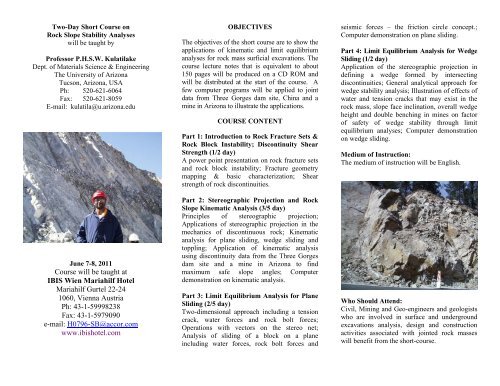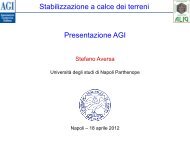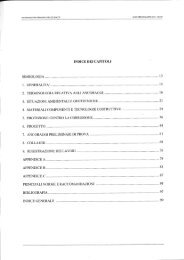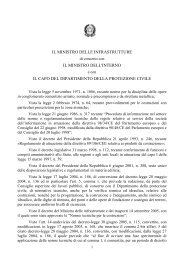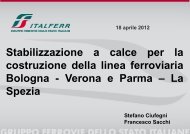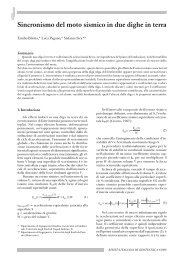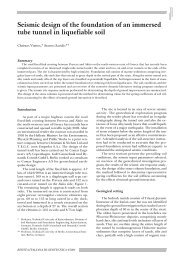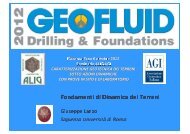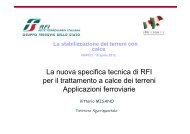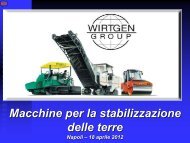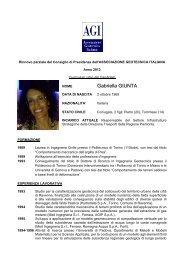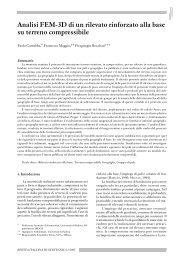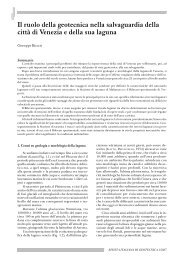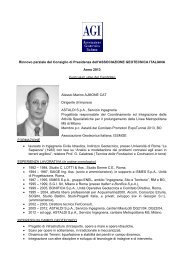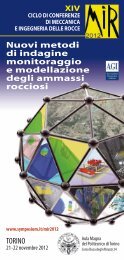Rock Slope Stability Analyses - Associazione Geotecnica Italiana
Rock Slope Stability Analyses - Associazione Geotecnica Italiana
Rock Slope Stability Analyses - Associazione Geotecnica Italiana
You also want an ePaper? Increase the reach of your titles
YUMPU automatically turns print PDFs into web optimized ePapers that Google loves.
Two-Day Short Course on<br />
<strong>Rock</strong> <strong>Slope</strong> <strong>Stability</strong> <strong>Analyses</strong><br />
will be taught by<br />
Professor P.H.S.W. Kulatilake<br />
Dept. of Materials Science & Engineering<br />
The University of Arizona<br />
Tucson, Arizona, USA<br />
Ph: 520-621-6064<br />
Fax: 520-621-8059<br />
E-mail: kulatila@u.arizona.edu<br />
June 7-8, 2011<br />
Course will be taught at<br />
IBIS Wien Mariahilf Hotel<br />
Mariahilf Gurtel 22-24<br />
1060, Vienna Austria<br />
Ph: 43-1-59998238<br />
Fax: 43-1-5979090<br />
e-mail: H0796-SB@accor.com<br />
www.ibishotel.com<br />
OBJECTIVES<br />
The objectives of the short course are to show the<br />
applications of kinematic and limit equilibrium<br />
analyses for rock mass surficial excavations. The<br />
course lecture notes that is equivalent to about<br />
150 pages will be produced on a CD ROM and<br />
will be distributed at the start of the course. A<br />
few computer programs will be applied to joint<br />
data from Three Gorges dam site, China and a<br />
mine in Arizona to illustrate the applications.<br />
COURSE CONTENT<br />
Part 1: Introduction to <strong>Rock</strong> Fracture Sets &<br />
<strong>Rock</strong> Block Instability; Discontinuity Shear<br />
Strength (1/2 day)<br />
A power point presentation on rock fracture sets<br />
and rock block instability; Fracture geometry<br />
mapping & basic characterization; Shear<br />
strength of rock discontinuities.<br />
Part 2: Stereographic Projection and <strong>Rock</strong><br />
<strong>Slope</strong> Kinematic Analysis (3/5 day)<br />
Principles of stereographic projection;<br />
Applications of stereographic projection in the<br />
mechanics of discontinuous rock; Kinematic<br />
analysis for plane sliding, wedge sliding and<br />
toppling; Application of kinematic analysis<br />
using discontinuity data from the Three Gorges<br />
dam site and a mine in Arizona to find<br />
maximum safe slope angles; Computer<br />
demonstration on kinematic analysis.<br />
Part 3: Limit Equilibrium Analysis for Plane<br />
Sliding (2/5 day)<br />
Two-dimensional approach including a tension<br />
crack, water forces and rock bolt forces;<br />
Operations with vectors on the stereo net;<br />
Analysis of sliding of a block on a plane<br />
including water forces, rock bolt forces and<br />
seismic forces – the friction circle concept.;<br />
Computer demonstration on plane sliding.<br />
Part 4: Limit Equilibrium Analysis for Wedge<br />
Sliding (1/2 day)<br />
Application of the stereographic projection in<br />
defining a wedge formed by intersecting<br />
discontinuities; General analytical approach for<br />
wedge stability analysis; Illustration of effects of<br />
water and tension cracks that may exist in the<br />
rock mass, slope face inclination, overall wedge<br />
height and double benching in mines on factor<br />
of safety of wedge stability through limit<br />
equilibrium analyses; Computer demonstration<br />
on wedge sliding.<br />
Medium of Instruction:<br />
The medium of instruction will be English.<br />
Who Should Attend:<br />
Civil, Mining and Geo-engineers and geologists<br />
who are involved in surface and underground<br />
excavations analysis, design and construction<br />
activities associated with jointed rock masses<br />
will benefit from the short-course.
Time Schedule (each day):<br />
8:30—10:15 Lectures/computer<br />
demonstrations<br />
10:15—10:30 Tea/Coffee break<br />
10:30—12:15 Lectures/computer<br />
demonstrations<br />
12:15-- 13:15 Lunch<br />
13:15-- 15:00 Lectures/computer<br />
demonstrations<br />
15:00-- 15:15 Tea/Coffee break<br />
15:15-- 17:00 Lectures/computer<br />
demonstrations<br />
Narrative Biography of Prof. Kulatilake:<br />
Pinnaduwa H.S.W. Kulatilake, Ph.D., P.E.,<br />
F.ASCE, is a Professor of<br />
Geological/Geotechnical Engineering at the<br />
University of Arizona. He has over 30 years<br />
of experience in rock mechanics,<br />
geotechnical engineering, and applications<br />
of probabilistic and numerical methods to<br />
geotechnical engineering. He has written<br />
over 150 papers and is a member of several<br />
technical committees. He has delivered 17<br />
keynote lectures and 40 other invited<br />
lectures throughout the world on topics<br />
related to fracture network modeling,<br />
probabilistic geotechnics, mechanical<br />
properties of joints, rock slope stability and<br />
mechanical and hydraulic behaviour of rock<br />
masses. He is a research paper reviewer for<br />
16 technical Journals and an editorial board<br />
member for Int. Jour. of <strong>Rock</strong> Mechanics &<br />
Mining Sciences and Int. Jour. of<br />
Geotechnical and Geological Engineering.<br />
He has taught short courses on stochastic<br />
fracture network modeling, rock slope<br />
stability analysis, block theory and joint<br />
roughness-aperture in Sweden, Mexico,<br />
Austria, USA, Canada, Hong Kong, Poland,<br />
Finland, Australia, South Korea, Sri Lanka,<br />
Egypt, Iran, Chile, China, Italy and Peru. He<br />
served over 20 years either as the primary or<br />
the sole examiner for the geological<br />
engineering professional exam conducted by<br />
the Arizona State Board of Technical<br />
Registration. He was a Visiting Professor at<br />
the Royal Institute of Technology and Lulea<br />
University of Technology in Sweden as part<br />
of his sabbatical leave. Also, he was a<br />
Visiting Research Fellow at the Norwegian<br />
Geotechnical Institute, for another part of<br />
his sabbatical leave. Due to the contributions<br />
that he made on teaching, research,<br />
consulting and service activities, he was<br />
elected to the Fellow Rank of the American<br />
Society of Civil Engineers at the relatively<br />
young age of 45. In 2002, he received<br />
Distinguished Alumnus Award from the<br />
College of Engineering, Ohio State<br />
University and Outstanding Asian American<br />
Faculty Award from the University of<br />
Arizona in recognition of his achievements<br />
and contributions made to the advancement<br />
of his profession. In December 2005,<br />
Eurasian National University, Kazakhstan<br />
conferred him “Honorary Professorship”. In<br />
August 2007, he organized and ran a very<br />
successful International Conference on Soil<br />
& <strong>Rock</strong> Engineering in Sri Lanka. In<br />
January 2009, he organized and ran a<br />
successful, high quality International<br />
Conference on <strong>Rock</strong> Joints and Jointed <strong>Rock</strong><br />
Masses in Tucson, Arizona.<br />
Registration Conditions:<br />
The course fee of US$ 895 must be paid in full<br />
by the registration deadline of April 30, 2011.<br />
The course fee includes course notes, lunch and<br />
refreshments for morning and afternoon<br />
tea/coffee breaks. The number of applicants for<br />
each course is limited and acceptance will be on<br />
a first come, first served basis. If the course is<br />
cancelled, then the full short course fee will be<br />
refunded. No refund will be given after April 30,<br />
2011. Non-arrivals at the course will be liable to<br />
pay the full course fee and no refund will be<br />
given. However, substitutions will be allowed.<br />
Name:<br />
Title:<br />
Registration Form<br />
Short Course on <strong>Rock</strong> <strong>Slope</strong> <strong>Stability</strong><br />
<strong>Analyses</strong>, Vienna, June 2011<br />
Organization:<br />
Mailing Address:<br />
Telephone Number:<br />
Fax Number:<br />
E-mail address:
Registration Fee: US $ 895<br />
I have read and agree to the conditions of entry<br />
as stipulated in this brochure.<br />
Signature :<br />
Date:<br />
Method of Payment:<br />
Option 1: Approval to charge to a credit card.<br />
Send name on card, card number, expiry date<br />
(MM/YY) and card verification number (3 digit<br />
code on back of card or 4 digit code on front of<br />
card located above the credit card number) to<br />
fax number: US Code-520-577-6515. Please<br />
follow up with an e-mail to:<br />
kulatila@u.arizona.edu stating that you sent a<br />
fax (please do not send credit card information<br />
through e-mail).<br />
Option 2: Make Cashier’s check or money order<br />
payable in US funds, through a US bank to:<br />
P.H.S.W. KULATILAKE and mail it to:<br />
Prof. P.H.S.W. Kulatilake<br />
Dept. of Materials Science & Engineering<br />
Mines Bldg. # 12, Rm 131<br />
1235 E. James E. Rogers Way<br />
University of Arizona<br />
Tucson, AZ 85721, USA<br />
Option 3: Wire transfer: Name of the bank,<br />
Routing number & the account number will be<br />
provided later upon receiving the completed<br />
Registration form.


